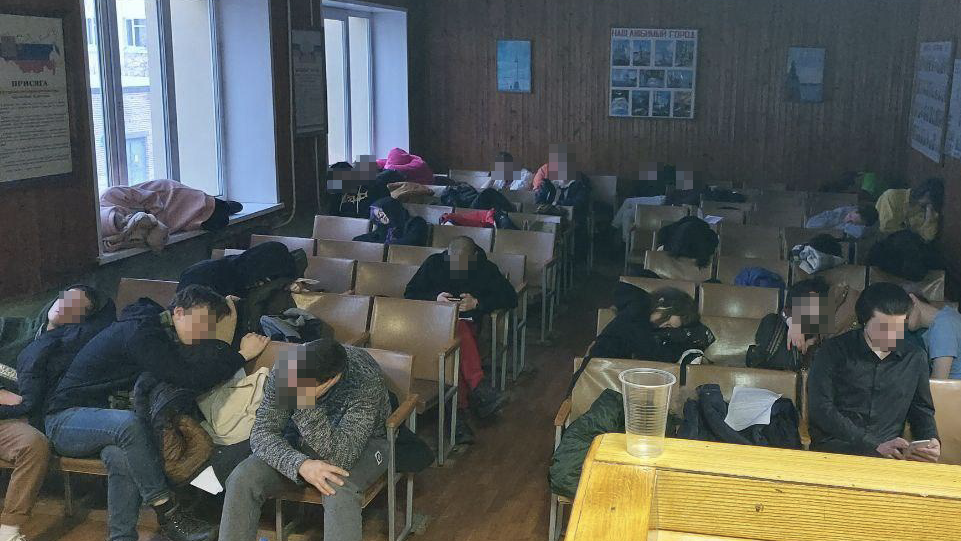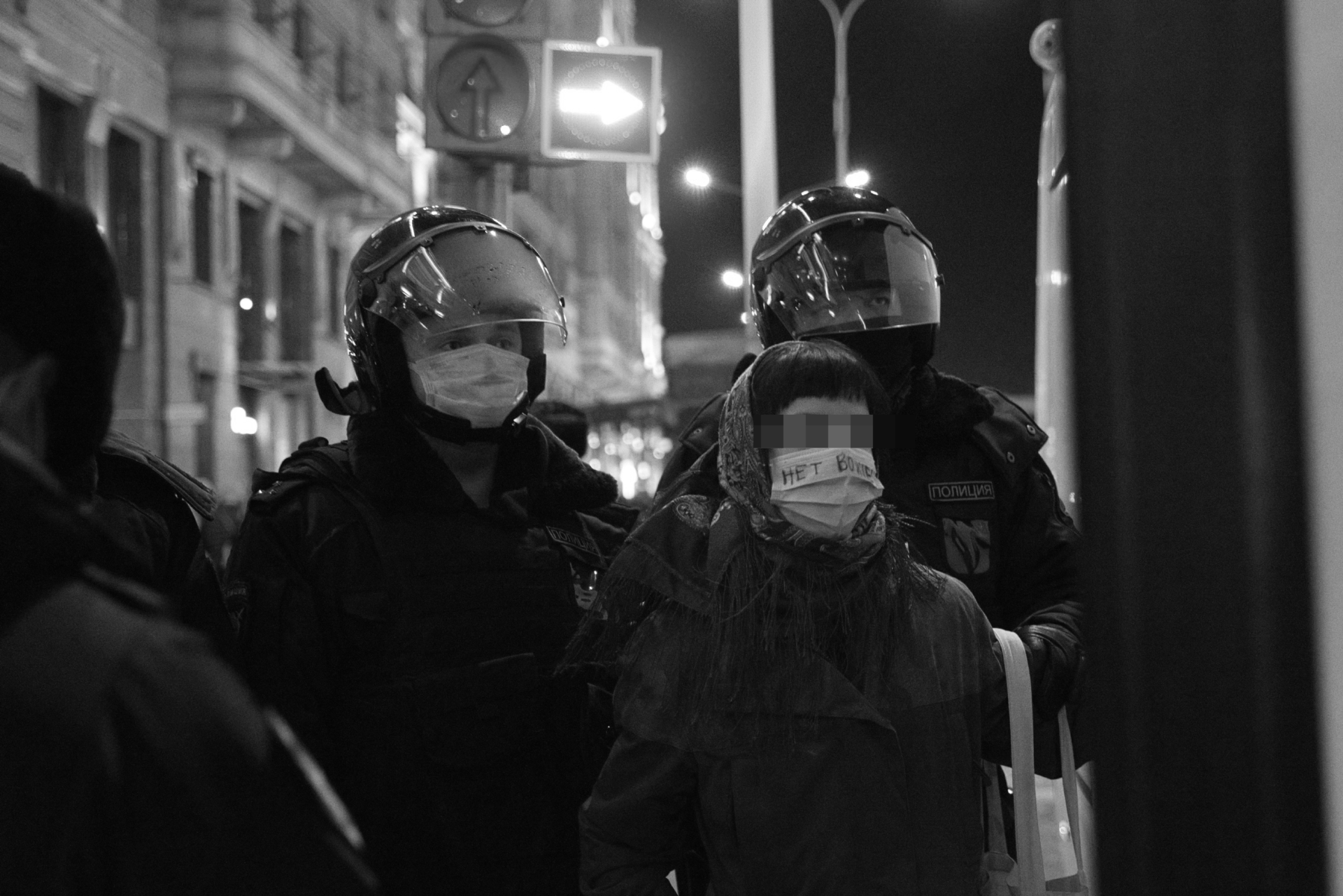Despite enormous odds, Russian civil society is pushing the country’s Constitutional Court to overturn the widespread prosecution of anti-war protests.
This op-ed was written by OVD-Info, an independent human rights defence and media group. OVD-Info focuses on the rights to freedom of assembly and expression but its work extends further. OVD-Info works on the ground in Russia and globally aiming at putting an end to political persecution in Russia.
OVD-Info, together with other Russian human rights defenders and organisations, has filed complaints with the Russian Constitutional Court arguing that a new administrative article prohibiting anti-war expression violates freedom of speech and must be repealed.
On 24 February 2022, Russia launched a large-scale invasion of Ukraine. This led to mass anti-war protests across the country. People went to the streets, shared their opinions online, and wrote petitions: all to express their disagreement with the decision to launch the unprovoked war and call for an end to it. OVD-Info documented 19 644 detentions of anti-war protesters, as well as at least 413 cases of the excessive use of police force against protesters.
The response of Russian authorities to anti-war sentiment was swift. Only eight days after the invasion, the government adopted new repressive legislation. It became a convenient tool for military censorship and the suppression of dissent. In particular, the authorities introduced notorious laws to ban the “discrediting” of, or spreading “false information” about the Russian army. These were adopted in just one day and without any public discussion. Anti-war opinion has subsequently been outlawed in Russia.

Article 20.3.3 of the Russian Code of Administrative Offences (hereinafter – CAO) turned out to be the most popular tool for the persecution of anti-war expression. Currently, 6,561 cases have been initiated under this article. People have been fined for participating in anti-war rallies, holding solo demonstrations with posters “No war” or “Peace”, spreading anti-war leaflets, wearing the colors of the Ukrainian flag on their clothes, sharing information online about attacks on the Ukrainian civilian population, and for simply using the word “war” instead of “special military operation”. Quite literally, any criticism of Russia’s war with Ukraine, irrespective of its form and content, is considered as “discrediting the Russian armed forces” and subject to a significant fine which is several times higher than the minimum wage in Russia.
Since the adoption of Article 20.3.3 of the CAO, it has been evident that this provision violates freedom of expression and freedom of assembly which are explicitly protected by the Russian Constitution and international law. That is why Russian human rights organisations OVD-Info, Memorial, Russia Behind Bars, as well as private attorneys cooperating with OVD-Info, formed a coalition to bring the cases of anti-war activists prosecuted for “discrediting” the Russian army to the Constitutional Court. Overall, we are filing around 20 cases and calling on the Constitutional Court to repeal Article 20.3.3 of the COA.
One of the applicants, Maksim Phillipov, was prosecuted for holding a solo demonstration and showing a poster with a quotation from the song of John Lennon, “Give Peace a Chance”. Christina Markus was fined for displaying a yellow-and-blue poster with the words, “Putin, who will answer for the atrocities in Bucha? 24.02 – ? stop this war!”. Christina Shatryuk, another applicant, wrote on her poster, “15 years for the phrase ‘NO WAR’?”. In fact, most of the applicants of the coalition have been charged under Article 20.3.3 for holding solo anti-war demonstrations. Others shared their opinions online, wore anti-war symbols on their clothes, or conducted performances. All of them expressed their disagreement with the war and were subsequently punished for it. Their attempts to appeal court decisions have not been successful. At the same time, the courts have failed to explain why and how anti-war expressions have discredited the Russian army.
The Constitutional Court of Russia is empowered to rule on the constitutionality of legislation. If the Court decides that Article 20.3.3 of the CAO contradicts the Constitution, the Article will be repealed and all cases of people prosecuted under this article reviewed and dismissed. Decisions of the Constitutional Court are final and apply to all state bodies and agents.
In our constitutional complaints, OVD-Info and our partners argue that Article 20.3.3 of the CAO violates the freedoms of conscience,expression and assembly, and constitutes discrimination on the grounds of political convictions. In particular, we specify that this article pursues the sole aim of suppressing dissent and anti-war voices, and that such restrictions on human rights violate the principles of a democratic state. As we argue, the State should not, through Article 20.3.3, target the expression of anti-war opinions, even if those found guilty are fined rather than arrested. Moreover, if an individual is found to be “discrediting the army” for a second time within a year of their original administrative prosecution, he or she faces a prison sentence of up to 5 years according to part 1 of Article 280.3 of the Criminal Code. This creates a chilling effect and prevents people from sharing their opinions publicly.
This is reminiscent of prosecution for anti-war expression that existed in the USSR during the war in Afghanistan in the 1980s. However, this practice was subsequently recognized as a form of “repression” and all prosecuted people were rehabilitated. Despite all this, history is repeating itself and anti-war expressions are outlawed once again.
In the following months, the Constitutional Court will consider our complaints and make a decision on whether or not the law prohibiting anti-war expression of all kinds violates the Russian Constitution. It is a last chance for the people prosecuted under this article to receive justice at the national level. For the Court it is a chance to demonstrate that the rule of law, the Russian Constitution, and human rights still mean something in Russia.
Large numbers of Russians do not support Russia’s war against Ukraine. This is clearly shown by the number of people prosecuted for expressing their anti-war opinions as well as the number of detentions during anti-war protests. People continue to protest against war every day, including children. Some of them wear “No war” signs on their clothes. Others put Ukrainian flags on their balconies or speak up at school or at work. They protest despite repressive legislation and attempts by the authorities to silence their voices, and they continue to do so.
Top photo – Moscow: A peaceful anti-war protester is detained by Russian police on 24 February 2022. Photo courtesy of Natalia B for OVD-Info.





